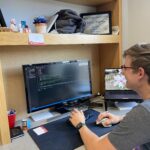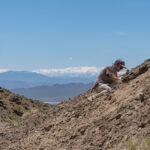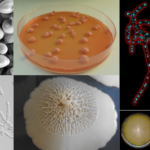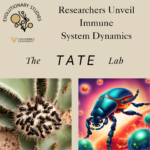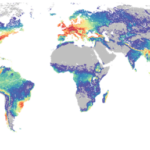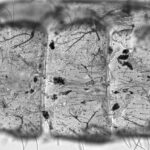Arts and Science
Analyzing Evolutionary Trade-Offs in Immune Systems: Computational Biology with Reese Martin
Jul. 22, 2024—By Nick McCoy, Evolutionary Studies undergraduate communications assistant Reese Martin has always been drawn to biology and exploring the behaviors of different organisms. During his childhood, he dug in anthills, and now he observes the life history traits of flower beetles and other taxa. Martin’s new first-author paper, “Pleiotropy Alleviates the Fitness Costs Associated With...
VU Graduate Student Explores Ancient Oral Microbiomes
Jun. 24, 2024—By Neomi Chen, Evolutionary Studies undergraduate communications assistant As Katie McCormack meticulously extracted calcified dental plaque from ancient Peruvian teeth, she felt the weight of centuries of history in her hands. This intricate work, part of her groundbreaking research in the Jada Benn Torres Lab, aims to unravel the secrets of ancient oral health. With...
Graduate Student Uncovers New Galactose Assimilation Pathway
Apr. 26, 2024—By: Andy Flick Evolutionary Studies Scientific Coordinator Not to be outdone by her significant contributions to a study that appeared in April 25’s Science magazine, Marie-Claire Harrison, a graduate student in the Rokas Lab, published a first-author article in the journal Proceedings of the National Academy of Sciences the very next day titled “Machine learning...
Unveiling Evolutionary Transitions: Vanderbilt Professor Explores Triassic Mammals’ Adaptations to Changing Environments
Apr. 26, 2024—By: Sarah Ward, Evolutionary Studies Communications Assistant Vanderbilt professor Neil Kelley assisted in a study which characterized the evolutionary response of 250-million-year-old (Triassic) mammals to habitat transitions. Their work was published August 2023 in the Swiss Journal of Paleontology, and it explores how similar mammals can react differently to the same environmental challenges. Kelley finds...
Vanderbilt Graduate Student is Getting to the Bottom of Worm Burrows
Apr. 26, 2024—By: Sarah Ward, Evolutionary Studies Graduate Communications Assistant Vanderbilt graduate student Katherine Turk and colleagues found that worm burrowing behaviors could have emerged earlier in earth’s history than was previously thought. Her work Archaeichnium haughtoni: a robust burrow lining from the Ediacaran–Cambrian transition of Namibia was published this January 2024 in Papers in Paleontology, and...
Vanderbilt Researchers Flip the Script on Yeast Ecological Diversity
Apr. 25, 2024—By: Andy Flick, Evolutionary Studies scientific coordinator A mere decade or two ago, decoding the genome of every organism in a major branch of the tree of life and deciphering their diets was a pipedream. In a groundbreaking study, a team of researchers from Vanderbilt University, the University of Wisconsin-Madison, and other institutions worldwide have...
Beckman Scholar Charu Balamurugan Unveils Evolutionary Insights into Penicillium Secondary Metabolites
Mar. 26, 2024—By: Andy Flick, Evolutionary Studies Scientific Coordinator Beckman Scholar Charu Balamurugan, an undergraduate researcher in the Rokas lab at Vanderbilt University, has shed light on the intricate evolutionary patterns governing secondary metabolite biosynthesis in fungi. Working with former Ph.D. student Jacob Steenwyk, lab PI Antonis Rokas, and collaborator and Global Scholars Program participant Gustavo Goldman,...
Insect Immune Insights: Researchers Unveil Immune System Dynamics
Mar. 12, 2024—By Andy Flick, Evolutionary Studies scientific coordinator Justin Critchlow, a recent Ph.D. student in Ann Tate’s lab, just published a paper with the labmates Arun Prakash (postdoctoral researcher), Katherine Zhong (former undergraduate), and Tate, uncovering the intricacies of beetle immune dynamics. The paper was just published in PLoS Pathogens, “Mapping the functional form of the...
Breaking the Mold: Kyle David’s Research Challenges Ecological Norms in Yeast Communities
Feb. 27, 2024—By: Andy Flick, Evolutionary Studies scientific coordinator Kyle David, an NSF postdoctoral fellow in the Rokas lab, and co-authors published a new paper, “Saccharomycotina yeasts defy longstanding macroecological patterns” in the high-impact journal PNAS. This paper, which looks at the ecology of 186 species of yeast, provides evidence that not all life-forms follow the rules....
Vanderbilt University biologists discover that rising temperature accelerates aging in mosquitoes, weakening their immune system
Jan. 25, 2024—By Sarah Ward, Evolutionary Studies graduate communications assistant Climate change may weaken mosquitoes by speeding up aging and slowing down their immune system. A study published January 10, 2024 in PLOS Pathogens by Vanderbilt biology graduate student Lindsay Martin and Centennial Professor of Biological Sciences Julián Hillyer found that mosquitoes age more quickly when temperatures...
